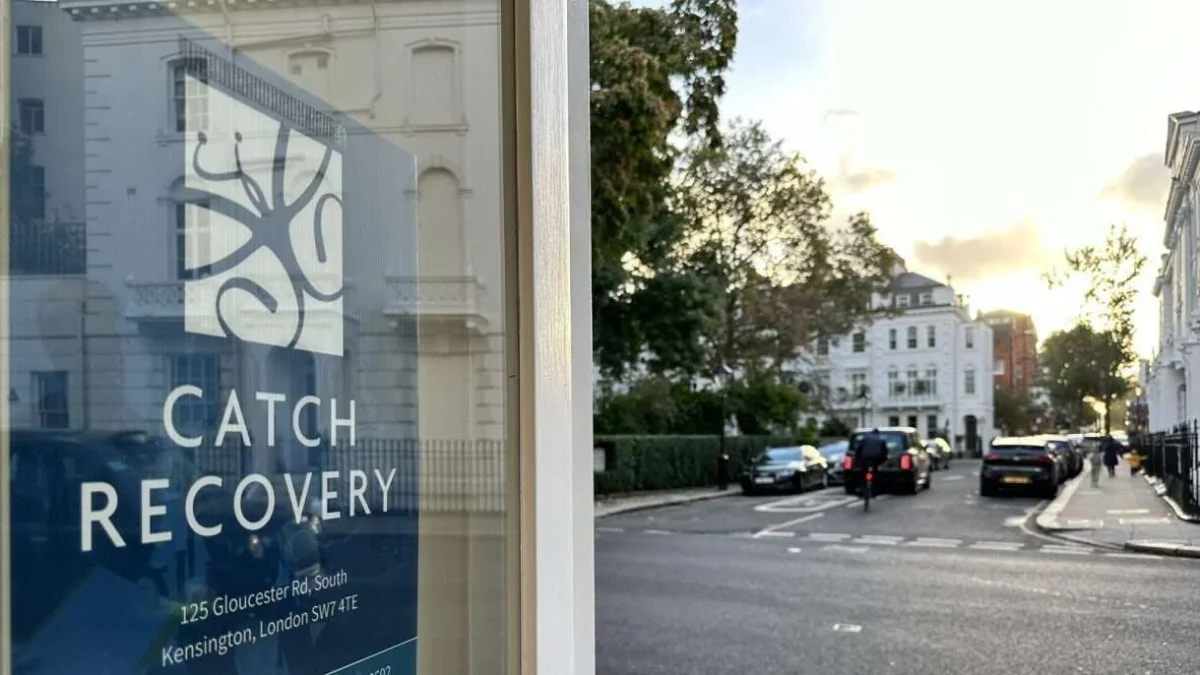
Specialised Addiction Treatment, Central London
This page introduces the services that we provide to the people located near Liverpool Street and the City of London.
This page introduces the services that we provide to the people of Liverpool Street and the City of London. At CATCH Recovery we understand that specialist addiction care providers are few and far between. We offer a number of ways for those outside of our immediate locality in central London to access our private addiction practice:
- Specialist addiction assessments,
- Psychiatrist assessments and clinical screenings,
- 12 Step therapy programmes,
- Private CBT and DBT sessions, with a specialist therapist,
- Referral for private detoxification from drugs and alcohol,
- Private residential rehab,
- Addiction counselling online,
- Sober transportation.
Our treatment is primarily based on an outpatient basis, which means that you can access our addiction psychotherapists, psychiatrists and recovery coaches from the City of London or anywhere in the UK or Europe.
We offer individual addiction counselling online from any location, including Liverpool Street. Additional services we offer to those in Liverpool Street and the City of London include interventions, a meeting at your home or online that helps people realise that they have an addiction and need help.
There are also various free alcohol and drug treatment services in Liverpool Street and the City of London which we will list on this page.
Alcohol and Drug Issues in the City of London
Alcoholism, cocaine addiction and gambling addiction issues among professionals working in the City of London (often referred to as the financial district) are influenced by the high-pressure, competitive, and demanding work environment. Some common addiction challenges faced by those working in this area include:
1. Alcohol Addiction
- Workplace Culture: Drinking is often ingrained in the social and professional culture in finance and law. After-work drinks, client meetings, and networking events frequently involve alcohol.
- Stress Relief: Many professionals turn to alcohol as a way to unwind after long, stressful workdays. High expectations and tight deadlines can lead to dependency on alcohol to relax.
2. Drug Addiction
- Stimulants: The fast-paced nature of work in finance, law, and consulting often leads some individuals to use stimulants like cocaine or prescription drugs (e.g., Adderall) to boost productivity and stay alert for long hours.
- Escapism: Some may also turn to drugs as a way of coping with anxiety, stress, or burnout. The accessibility of wealth in this area can make high-cost drugs more attainable.
3. Prescription Drug Abuse
- Professionals may develop dependencies on prescription medications like benzodiazepines (for anxiety) or opioids (for physical pain), particularly as they try to manage the mental and physical toll of long work hours.
4. Gambling Addiction
- Given the high stakes, risk-taking behavior in the financial sector, some professionals may be prone to gambling addiction, particularly through online platforms and cryptocurrency gambling. The adrenaline rush associated with gambling can mirror the excitement and risks of high-pressure jobs.
5. Workaholism
- While not always recognised as a traditional addiction as defined by DSM-5, workaholism can be equally damaging. Many professionals in the City of London work excessive hours, which can lead to burnout, relationship issues, and an inability to maintain a healthy work-life balance.

Download Brochure
Types of Addiction Counselling in Liverpool Street and the City of London
We understand the value of providing various addiction therapy services to accommodate various requirements. Private counselling, psychiatrist case reviews, clinical assessments, 12 Step programmes and online consultations are among the specialist services we offer at CATCH Recovery.

Private Addiction Counselling
There are many benefits to choosing private addiction counselling. By choosing this strategy, people have the chance to have one-on-one sessions with an experienced therapist who can give their whole attention to helping them heal. A complete investigation of the underlying problems is made possible by this individualised support, opening the door for the creation of custom treatment plans that are tailored to the patient’s needs.

Online Addiction Counselling
Due to its simplicity and adaptability, online addiction treatment is becoming more and more popular since it gives people a convenient and flexible way to get help. People can actively participate in treatment sessions from the comfort of their homes using safe digital platforms. This method overcomes geographic limitations and improves accessibility, addressing the needs of people who might run into practical difficulties or who would prefer a more private option.

Psychiatrist Screening Reviews
This is a 60-minute psychiatric assessment that can be conducted on the phone or via a video call with a Consultant Psychiatrist who specialises in addiction. The aim of the review is build a comprehensive picture of your unique needs which will go on to inform your personalised care plan.
The Role of the Therapist in Addiction Counselling
The presence of a therapist is crucial in addiction counselling because they provide invaluable expert advice and consistent support throughout the recovery process. These knowledgeable people help people unearth underlying trauma, treat underlying problems, and create healthy coping systems. When a person has a dual diagnosis, which means they have both a mental health illness and an addiction, therapists are essential to effectively managing both conditions at once.
Evidence-Based Therapies
For the highest level of effectiveness in our addiction counselling, CATCH Recovery uses evidence-based approaches. A few of these treatments are:
- Cognitive-behavioural therapy (CBT): This strategy focuses on altering unfavourable thought patterns and actions connected to addiction, opening the door for constructive change.
- Dialectical Behaviour Therapy (DBT): DBT helps people learn effective coping mechanisms and manage their emotions by combining acceptance and change tactics.
- Group therapy: Participating in group sessions provides people with a useful forum for peer support, inspiration, and experience sharing, which helps people feel more like a part of a community.
- Family therapy: Including the family in the rehabilitation process helps improve bonds, address familial issues, and foster a positive atmosphere for long-term recovery.

Start Your Recovery Journey Today
How Effective is Addiction Counselling?
The success of addiction counselling is affected by many variables. The your readiness and willingness to accept change have a significant impact on the outcomes, first and foremost. The effectiveness of the therapy is also greatly influenced by the counsellor’s ability to provide high-quality treatment, their experience, and the development of a solid therapeutic relationship. Last but not least, choosing a therapeutic strategy that fits the person’s requirements and preferences is crucial for a successful recovery path.
What to Expect from Addiction Counselling at CATCH Recovery Near Liverpool Street and the City of London
The principles of “Connection, Acceptance, Transformation, Continuity, and Hope” shape the therapeutic interventions and the road to recovery. Our programme gives you the skills you need for sustained recovery by combining evidence-based therapies, holistic care, and continuing support.
We offer a whole approach to care, addressing your physical, psychological, and emotional well-being through collaborations with psychologists, counsellors and support groups. This multidisciplinary partnership ensures the fundamental nature of the therapeutic process.
CATCH Recovery is a tailored programme prioritising each client’s needs, evidence-based treatments, and ongoing support. Our devoted team of therapists/therapists/is committed to assisting you in overcoming addiction and rebuilding your life by offering the knowledge and compassion needed.

Support Groups Serving Liverpool Street and the City of London
Support groups are essential to the recovery process because they provide people with a great source of understanding and support. Using the well-known 12-step approach, groups like Alcoholics Anonymous (AA), Narcotics Anonymous (NA), and FAMANON foster a community of peers who can relate to each other’s experiences. These groups provide people with a secure setting where they may open up about their experiences, gain support, and pick up tips from others who have travelled a similar journey. The 12-step programme strongly emphasises taking personal responsibility, growing spiritually, and acknowledging one’s helplessness against addiction. You will create a framework for self-reflection, making amends, and creating a greater relationship with yourself and others by actively participating in the 12 steps.
Regarding early recovery, CATCH Recovery recognises the value of ongoing support and the help offered by 12-step support groups. We provide them with an additional degree of support and accountability through our sober companion programme. This service provides a sober companion who can help people negotiate daily obstacles while maintaining sobriety and striving for long-term recovery. This companion can provide critical reassurance, useful direction, and emotional support.

Find Out if Outpatient Therapy Is Right for You
FAQs
How do I find a suitable therapist in Liverpool Street and the City of London?
Finding a therapist specialising in addiction can be challenging due to the high demand. However, organisations like the British Association for Counselling and Psychotherapy (BACP) can provide resources and referrals. Additionally, the CATCH team can guide you in finding the right therapist for your specific needs.
What is the most effective psychological treatment for addiction?
While there is no one-size-fits-all answer, a combined approach incorporating evidence-based therapies, personalised support, and ongoing care yields positive results. Private therapy, emphasising tailored care and individual attention, often offers higher levels of support and better outcomes.
How long should I attend therapy?
The duration of therapy varies and depends on multiple factors, including the severity of addiction, individual progress, and personal goals. A therapist can work with you to develop a treatment plan that outlines an appropriate timeframe for therapy sessions.